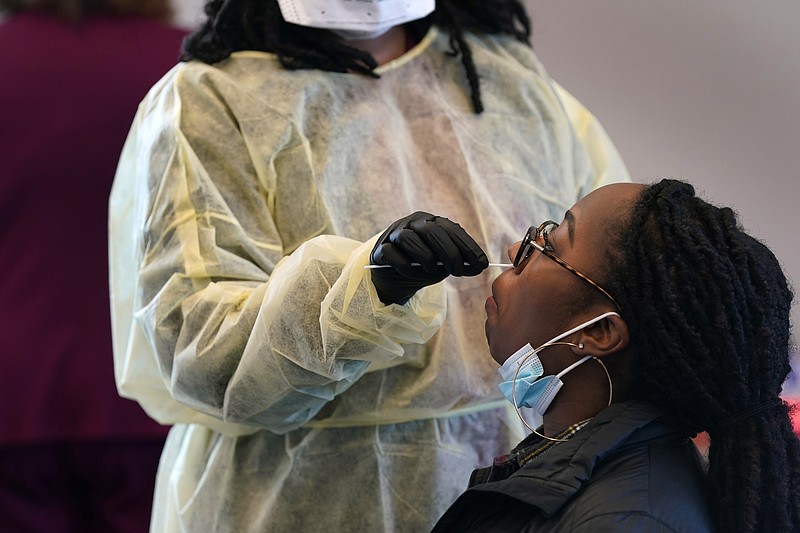The decision by the Northwest Georgia Health District to no longer offer free COVID-19 testing had been in the works for nearly three months, as demand had dropped off in the area.
However, some public health experts worry that no longer providing the testing could give the public a false sense of security, believing that because the vaccine has arrived it's no longer necessary.
The number of coronavirus tests administered in Northwest Georgia has seen a decline in recent weeks.
In Walker County, for example, 271 tests were given on Jan. 10. Since then, the most given in a single day was 218 on Jan. 16, and the daily average for tests taken has dropped off. In Catoosa County, 311 tests were recorded on Jan. 15 and the highest total since then was 90 on Feb. 18.
Residents of Northwest Georgia are getting tested for COVID-19 at rates that are similar to the numbers in August 2020 in most counties.
Logan Boss, spokesperson for the Northwest Georgia Health District, said that was one of the reasons the district decided to end the free testing.
"We began seeing a decline in demand for testing," he said. "We initially went from having our testing six days a week in all 10 counties to where we are now, where we're testing four days a week in five counties. There's still some demand, but it's a significant decrease from what it was even six months ago and certainly nine months ago."
Another reason for the change was so the health district could focus more of its resources on vaccine administration. The vaccine rollout got off to a bumpy start in Northwest Georgia, and now district officials are banking on focusing more time and effort solely on that effort.
Dr. Susan Butler-Wu, associate professor of clinical pathology at the Keck School of Medicine at the University of Southern California and a clinical microbiology lab director in Los Angeles, said there is a need for balance when it comes to prioritizing vaccines over testing.
"The main priority is trying to get as many shots into arms as possible," she said. "Just because we're putting more shots into people's arms, and that's a wonderful thing and we need to be really focused as a country to get that done as quickly as possible, it doesn't remove the need for testing."
Boss said the health district is coming from a different perspective.
"People need to remember they don't necessarily have to be tested. If people think they've been exposed to COVID-19 or even [are] symptomatic, they can check with their health care provider, discuss their situation, quarantine themselves for 10 or 14 days and can monitor their symptoms," he said. "Especially if they have difficulty breathing, they can seek medical assistance, but getting tested is not absolutely necessary."
Butler-Wu said that getting rid of free testing in all 10 counties could give the public a false sense of security and lead people to start to think the pandemic is over.
"The bottom line is it's making it seem like, 'OK, now that we've got vaccines coming, who cares about testing?'" Butler-Wu said. "It's not an either/or, it's a one plus the other."
In the North Georgia Health District (including Whitfield and Murray counties) testing also has been scaled back over the last two months. Residents there now have only two options to get tested: drive-through sites in Dalton in Whitfield County and Woodstock in Cherokee County. Tests are given weekdays from 8 a.m. to 3 p.m.
More funding for COVID-19 testing is part of the Biden administration's COVID-19 relief package under negotiation in Congress, and the administration plans to find ways to expand testing.
The administration also recently announced plans to buy 8.5 million of the newly authorized, fully-at-home rapid tests.
Boss said he didn't want to speculate or discuss proposed bills or relief packages as that relates to the health district's plan to again offer free COVID-19 tests. He did say the health district is always ready to adapt to the ongoing pandemic as new variants of the coronavirus continue to pop up.
"If the pandemic takes a turn where offering free testing is absolutely critical to the public health effort to deal with it, we would certainly reconsider getting back into the free testing mode," he said.
Residents of Catoosa, Chattooga, Dade, Gordon and Walker counties who want to get tested can visit hhs.gov for a list of health clinics and select pharmacies offering free tests. In Dade and Chattooga counties, there are federally qualified health centers where tests are available, as well.
Contact Patrick Filbin at pfilbin@timesfreepress.com.
